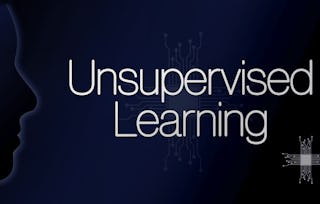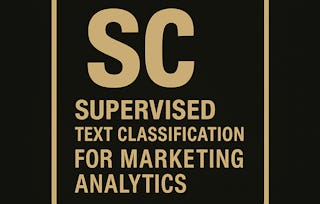Welcome to the Supervised Learning and Its Applications in Marketing course! Supervised learning is the process of making an algorithm to learn to map an input to a particular output. Supervised learning algorithms can help make predictions for new unseen data. In this course, you will use the Python programming language, which is an effective tool for machine learning applications. You will be introduced to the supervised learning techniques: regression and classification. The course will focus on the applications of these techniques in the domain of marketing.
即将结束: 只需 199 美元(原价 399 美元)即可通过 Coursera Plus 学习新技能。立即节省

Supervised Learning and Its Applications in Marketing
本课程是 Machine Learning for Marketing 专项课程 的一部分

位教师:Ambica Ghai
1,677 人已注册
包含在 中
您将学到什么
Apply Python as an effective tool for supervised learning techniques.
Develop and train supervised machine learning models for classification and regression tasks.
Interpret and analyze various applications of supervised learning in marketing.
Describe the deployment of machine learning models and the challenges encountered in the deployment.
您将获得的技能
- Customer Analysis
- Marketing Analytics
- Supervised Learning
- Model Deployment
- Marketing
- Scikit Learn (Machine Learning Library)
- Personalized Service
- Python Programming
- Machine Learning
- Marketing Strategies
- Applied Machine Learning
- Data Preprocessing
- Customer Retention
- Predictive Modeling
- Model Evaluation
- Predictive Analytics
要了解的详细信息

添加到您的领英档案
36 项作业
了解顶级公司的员工如何掌握热门技能

积累特定领域的专业知识
- 向行业专家学习新概念
- 获得对主题或工具的基础理解
- 通过实践项目培养工作相关技能
- 获得可共享的职业证书

该课程共有12个模块
In this module, you will be introduced to the concept and applications of supervised learning with various real-life examples. The module will introduce you to the major challenges faced by marketers in this fast-paced world. You will also learn the introductory concepts of machine learning. Practical applications of supervised learning in marketing, including customer segmentation, churn prediction, recommendation systems, and predictive modeling, will be emphasized through case studies. By the end of the module, you will have the skills to apply supervised learning algorithms effectively in marketing analytics and make data-driven decisions to drive business growth.
涵盖的内容
5个视频5篇阅读材料4个作业1个讨论话题
In this module, you will be introduced to some key performance indicators (KPIs) and learn how to visualize these key metrics. You will learn how to compute and build visual plots of these KPIs in Python and how to use machine learning algorithms to understand what drives the successes and failures of marketing campaigns. This module is designed to provide learners with a comprehensive introduction to the fundamental concepts and practical applications of supervised learning in the field of marketing. In this module, learners will explore the basics of supervised learning, including the distinction between labeled and unlabeled data and the process of training and evaluation of supervised learning models. Throughout the module, learners will also gain hands-on experience working with industry-standard tools and platforms, such as Python and scikit-learn, to implement and evaluate supervised learning models. By the end of the module, learners will have the necessary knowledge and skills to apply supervised learning techniques to extract valuable insights from marketing data and make data-driven decisions that drive business growth and success.
涵盖的内容
4个视频4篇阅读材料4个作业
This assessment is a graded quiz based on the modules covered this week.
涵盖的内容
1个作业
In this module, you will dive deeper into the world of decision trees and gain hands-on experience in building and interpreting these powerful models. Through practical exercises and Python programming, you will learn how to construct decision trees from scratch and leverage them to extract valuable insights from marketing data. Additionally, you will explore the significance of product analysis and discover how to uncover crucial analytical components using Python-based tools and techniques. By the end of this module, you will have a comprehensive understanding of decision trees, their application in marketing, and the ability to derive actionable insights from your data-driven analyses. Get ready to sharpen your analytical skills and unlock the potential of decision trees in the realm of marketing.
涵盖的内容
4个视频4篇阅读材料4个作业
In this module, you will explore the fascinating world of product recommendation systems. You will learn how these systems leverage machine learning techniques to provide personalized recommendations to customers, enhancing their shopping experience and driving sales. You will understand the different types of recommendation algorithms, such as collaborative filtering and content-based filtering, and how they can be implemented using Python. Through hands-on exercises and real-world examples, you will discover how to collect and analyze customer data, build recommendation models, and evaluate their performance. By the end of this module, you will have the skills and knowledge to develop and deploy effective product recommendation systems, enabling you to target customers with tailored recommendations and improve customer satisfaction and engagement.
涵盖的内容
4个视频4篇阅读材料4个作业1个讨论话题
This assessment is a graded quiz based on the modules covered this week.
涵盖的内容
1个作业
In this module, you will delve into the fascinating world of customer analytics and gain valuable insights into how data can be leveraged to understand customer behavior in a marketing context. Through a combination of theory and hands-on practice, you will learn how to apply supervised learning techniques to predict the likelihood of marketing engagement. By analyzing historical customer data and implementing machine learning algorithms in Python, you will discover how to uncover patterns, trends, and hidden insights that can drive effective marketing strategies. The module will also provide practical guidance on implementing customer analytics using Python, enabling you to manipulate, analyze, and visualize data to extract meaningful information. By the end of this module, you will have a solid foundation in customer analytics and be equipped with the skills to make data-driven marketing decisions, enhance customer engagement, and maximize business success.
涵盖的内容
4个视频4篇阅读材料4个作业1个讨论话题
In this module, you will delve into the concept of customer lifetime value (CLV) and its significance in marketing. You will learn how to measure CLV, which involves quantifying the long-term value a customer brings to a business. By understanding CLV, you can make informed decisions regarding customer acquisition, retention, and marketing strategies. Additionally, you will explore machine learning models specifically designed for CLV predictions. You will gain hands-on experience in building and training these models using Python, allowing you to forecast the future value of customers based on their historical data. By the end of the module, you will have a comprehensive understanding of CLV and the skills to develop accurate predictions using machine learning techniques, empowering you to make data-driven decisions to maximize customer value and drive business growth.
涵盖的内容
4个视频4篇阅读材料4个作业1个讨论话题
This assessment is a graded quiz based on the modules covered this week.
涵盖的内容
1个作业
In this module, you will delve into the topic of customer churn prediction and retention strategies. You will learn how to identify customers who are at risk of churning and implement proactive measures to retain them. Additionally, you will explore the application of artificial neural networks (ANNs) in predicting customer churn. ANNs are powerful machine learning models that can capture complex patterns and relationships in the data. You will gain hands-on experience in building neural network models using Python and leveraging their predictive capabilities to identify customers who are likely to churn. By the end of this module, you will be equipped with the knowledge and tools to analyze customer churn data, develop effective retention strategies, and implement neural network models to predict customer churn in the marketing domain.
涵盖的内容
4个视频4篇阅读材料4个作业
In this module, you will delve into the real-life challenges associated with deploying artificial intelligence (AI) solutions, explore the issues organizations commonly face, and examine the future scope of AI technologies. The module will provide a comprehensive understanding of the practical considerations and obstacles encountered while implementing AI in various industries and sectors. You will explore topics such as data quality and availability, ethical considerations, regulatory compliance, model interpretability, and scalability. Additionally, you will gain insights into the potential impact of AI on the job market, economy, and society as a whole. By the end of the module, you will be equipped with valuable knowledge and perspectives to navigate the complexities of AI deployment, anticipate future trends and challenges, and make informed decisions to drive successful AI initiatives in real-world scenarios.
涵盖的内容
4个视频4篇阅读材料4个作业
This assessment is a graded quiz based on the modules covered this week.
涵盖的内容
1个视频1个作业
获得职业证书
将此证书添加到您的 LinkedIn 个人资料、简历或履历中。在社交媒体和绩效考核中分享。
位教师

从 Marketing 浏览更多内容
 状态:免费试用
状态:免费试用O.P. Jindal Global University
 状态:免费试用
状态:免费试用University of Colorado System
 状态:免费试用
状态:免费试用O.P. Jindal Global University
 状态:免费试用
状态:免费试用University of Colorado Boulder
人们为什么选择 Coursera 来帮助自己实现职业发展




常见问题
To access the course materials, assignments and to earn a Certificate, you will need to purchase the Certificate experience when you enroll in a course. You can try a Free Trial instead, or apply for Financial Aid. The course may offer 'Full Course, No Certificate' instead. This option lets you see all course materials, submit required assessments, and get a final grade. This also means that you will not be able to purchase a Certificate experience.
When you enroll in the course, you get access to all of the courses in the Specialization, and you earn a certificate when you complete the work. Your electronic Certificate will be added to your Accomplishments page - from there, you can print your Certificate or add it to your LinkedIn profile.
Yes. In select learning programs, you can apply for financial aid or a scholarship if you can’t afford the enrollment fee. If fin aid or scholarship is available for your learning program selection, you’ll find a link to apply on the description page.
更多问题
提供助学金,






